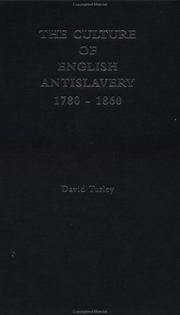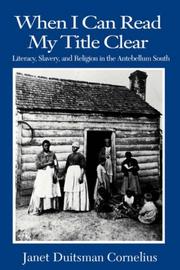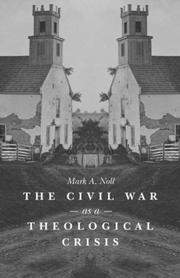| Listing 1 - 10 of 29 | << page >> |
Sort by
|
Book
Year: 2017 Publisher: [Place of publication not identified] : Great Neck Publishing,
Abstract | Keywords | Export | Availability | Bookmark
 Loading...
Loading...Choose an application
- Reference Manager
- EndNote
- RefWorks (Direct export to RefWorks)
Book
Year: 1854 Publisher: Project Gutenberg
Abstract | Keywords | Export | Availability | Bookmark
 Loading...
Loading...Choose an application
- Reference Manager
- EndNote
- RefWorks (Direct export to RefWorks)
Slave trade --- Slavery --- Slavery and the church. --- History.
Book
ISBN: 1400879019 9781400879014 0691624259 9780691624259 069104564X Year: 1965 Publisher: Princeton University Press : Princeton, New Jersey,
Abstract | Keywords | Export | Availability | Bookmark
 Loading...
Loading...Choose an application
- Reference Manager
- EndNote
- RefWorks (Direct export to RefWorks)
The growing appeal of abolitionism and its increasing success in converting Americans to the antislavery cause, a generation before the Civil War, is clearly revealed in this book on the Methodist Episcopal Church in America. The moral character of the antislavery movement is stressed. Originally published in 1965.The Princeton Legacy Library uses the latest print-on-demand technology to again make available previously out-of-print books from the distinguished backlist of Princeton University Press. These editions preserve the original texts of these important books while presenting them in durable paperback and hardcover editions. The goal of the Princeton Legacy Library is to vastly increase access to the rich scholarly heritage found in the thousands of books published by Princeton University Press since its founding in 1905.
Slavery and the church --- Church and slavery --- Church --- Methodist Episcopal Church.
Book
ISBN: 1611462010 1611462029 9781611462029 9781611462012 Year: 2016 Publisher: Bethlehem : Lehigh University Press,
Abstract | Keywords | Export | Availability | Bookmark
 Loading...
Loading...Choose an application
- Reference Manager
- EndNote
- RefWorks (Direct export to RefWorks)
Faith and Slavery considers how in diverse places-the New Hebrides, Scotland, the United States, and East Central Africa-the Presbyterian faith shaped men's and women's interpretations of and interactions with chattel slavery. The chapters highlight how the particular ways Presbyterians framed the Reformed Tradition made slavery an especially problematic and fraught issue for adherents to the faith, and led to a variety of reactions to slavery-ranging from abolitionism, to indifference, to support.
Slavery and the church --- Presbyterian --- Presbyterian Church. --- Doctrines. --- Church and slavery --- Church

ISBN: 0203285751 1280326166 113497745X 0203169336 9780203285756 9780203169339 9781134977444 1134977441 0415020085 9780415020084 9781134977406 9781134977451 9781138009042 1138009040 Year: 1991 Publisher: London ; New York : Routledge,
Abstract | Keywords | Export | Availability | Bookmark
 Loading...
Loading...Choose an application
- Reference Manager
- EndNote
- RefWorks (Direct export to RefWorks)
This book provides a fresh overall account of organised antislavery by focusing on the active minority of abolutionists throughout the country. The analysis of their culture of reform demonstrates the way in which alliances of diverse religious groups roused public opinion and influenced political leaders. The resulting definition of the distinctive `reform mentality' links antislavery to other efforts at moral and social improvement and highlights its contradictory relations to the social effects of industrialization and the growth of liberalism.
Antislavery movements --- Abolitionists --- Social reformers --- Slavery and the church --- Church and slavery --- Church --- Reformers --- History. --- Great Britain --- History --- Slavery - Great Britain - Anti-slavery movements. --- Abolitionists - Great Britain - History. --- Social reformers - Great Britain - History. --- Slavery and the church - Great Britain - History.

ISBN: 0585322910 9780585322919 9780872498716 0872498719 0872498719 0872497372 9780872497375 Year: 1991 Publisher: Columbia, S.C. : University of South Carolina Press,
Abstract | Keywords | Export | Availability | Bookmark
 Loading...
Loading...Choose an application
- Reference Manager
- EndNote
- RefWorks (Direct export to RefWorks)
Slavery --- Literacy --- Slaves --- Slavery and the church --- Education --- Enslaved persons --- Persons --- Illiteracy --- General education --- History. --- Social aspects
Book
ISBN: 1283110490 9786613110497 0820340707 9781283110495 9780820340708 Year: 1998 Publisher: Athens, Ga. : University of Georgia Press,
Abstract | Keywords | Export | Availability | Bookmark
 Loading...
Loading...Choose an application
- Reference Manager
- EndNote
- RefWorks (Direct export to RefWorks)
The fall of the Confederacy proved traumatic for a people who fought with the belief that God was on their side. Yet, as Eugene D. Genovese writes in A Consuming Fire, Southern Christians continued to trust in the Lord's will. The churches had long defended "southern rights" and insisted upon the divine sanction for slavery, but they also warned that God was testing His people, who must bring slavery up to biblical standards or face the wrath of an angry God. In the eyes of proslavery theorists, clerical and lay, social relations and material conditions affected the extent and pace of the spread of the Gospel and men's preparation to receive it. For proslavery spokesmen, "Christian slavery" offered the South, indeed the world, the best hope for the vital work of preparation for the Kingdom, but they acknowledged that, from a Christian point of view, the slavery practiced in the South left much to be desired. For them, the struggle to reform, or rather transform, social relations was nothing less than a struggle to justify the trust God placed in them when He sanctioned slavery. The reform campaign of prominent ministers and church laymen featured demands to secure slave marriages and family life, repeal the laws against slave literacy, and punish cruel masters. A Consuming Fire analyzes the strength, weakness, and failure of the struggle for reform and the nature and significance of southern Christian orthodoxy and its vision of a proper social order, class structure, and race relations.
Slavery and the church --- Slavery --- History --- Southern States --- Confederate States of America --- Church history --- Religious aspects --- Christianity.

ISBN: 9798890880963 0807877204 9780807877203 0807830127 9780807830123 Year: 2006 Publisher: Chapel Hill : University of North Carolina Press,
Abstract | Keywords | Export | Availability | Bookmark
 Loading...
Loading...Choose an application
- Reference Manager
- EndNote
- RefWorks (Direct export to RefWorks)
Viewing the Civil War as a major turning point in American religious thought, Mark A. Noll examines writings about slavery and race from Americans both white and black, northern and southern, and includes commentary from Protestants and Catholics in Europe and Canada. Though the Christians on all sides agreed that the Bible was authoritative, their interpretations of slavery in Scripture led to a full-blown theological crisis.
Slavery and the church --- Slavery --- History --- Moral and ethical aspects --- United States --- Influence. --- Religious aspects. --- Church history
Book
ISBN: 1512602973 Year: 2018 Publisher: Hanover, New Hampshire : Dartmouth College Press,
Abstract | Keywords | Export | Availability | Bookmark
 Loading...
Loading...Choose an application
- Reference Manager
- EndNote
- RefWorks (Direct export to RefWorks)
Slavery --- Slavery and the church --- Slaves --- Indentured servants --- Household employees --- Puritans --- History. --- Religious aspects. --- Social conditions. --- New England --- History
Book
ISBN: 9780252096129 0252096126 9780252038266 1306980933 9781306980937 0252038266 Year: 2014 Publisher: Urbana, [Illinois] : University of Illinois Press,
Abstract | Keywords | Export | Availability | Bookmark
 Loading...
Loading...Choose an application
- Reference Manager
- EndNote
- RefWorks (Direct export to RefWorks)
This collection of fifteen insightful essays examines the complexity and diversity of Quaker antislavery attitudes across three centuries, from 1658 to 1890. Contributors from a range of disciplines, nations, and faith backgrounds show how Quakers often disagreed with one another and the larger antislavery movement about slavery itself and the best path to emancipation. Far from having monolithic beliefs, Quakers embraced such diverse approaches as benevolent slaveholding, both gradual and comprehensive abolition, and consumer boycotts of slave-produced products. These evolving and uneven conceptions of slavery and emancipation were similar to the varied views Quakers had on racial integration. Offering a nuanced interpretation of these controversial topics--one that often diverges from existing scholarship--contributors discuss how Quakers attempted to live out their faith's antislavery imperative. Essays address Quaker missions in Barbados; the interplay between African-American and Quaker communities in Pennsylvania and New Jersey; transatlantic correspondence between a colonialist Quaker and a freed slave who "returned-to-Africa" as a Liberian colonist; and the impact of Quaker-authored frontier literature. Not surprisingly, this complicated and evolving antislavery sensibility left behind an equally complicated legacy. Focusing on Great Britain, France, and the United States, contributors show how Quaker antislavery actions and writings influenced revolutions and antislavery in those countries. Yet the Quaker contribution is also a hidden one because it so rarely receives substantive attention in modern classrooms and scholarship. This volume faithfully seeks to correct that oversight, offering accessible and provocative new insights on this key chapter of religious, political, and cultural history. Contributors include Dee E. Andrews, Kristen Block, Brycchan Carey, Christopher Densmore, Andrew Diemer, J. William Frost, Thomas D. Hamm, Nancy A. Hewitt, Maurice Jackson, Anna Vaughan Kett, Emma Jones Lapsansky-Werner, Gary B. Nash, Geoffrey Plank, Ellen M. Ross, Marie-Jeanne Rossignol, James Emmett Ryan, and James Walvin.
Antislavery movements --- Quaker abolitionists --- Slavery and the church --- Abolitionists --- Abolitionism --- Anti-slavery movements --- Slavery --- Human rights movements --- Church and slavery --- Church --- History. --- Society of Friends
| Listing 1 - 10 of 29 | << page >> |
Sort by
|

 Search
Search Feedback
Feedback About UniCat
About UniCat  Help
Help News
News